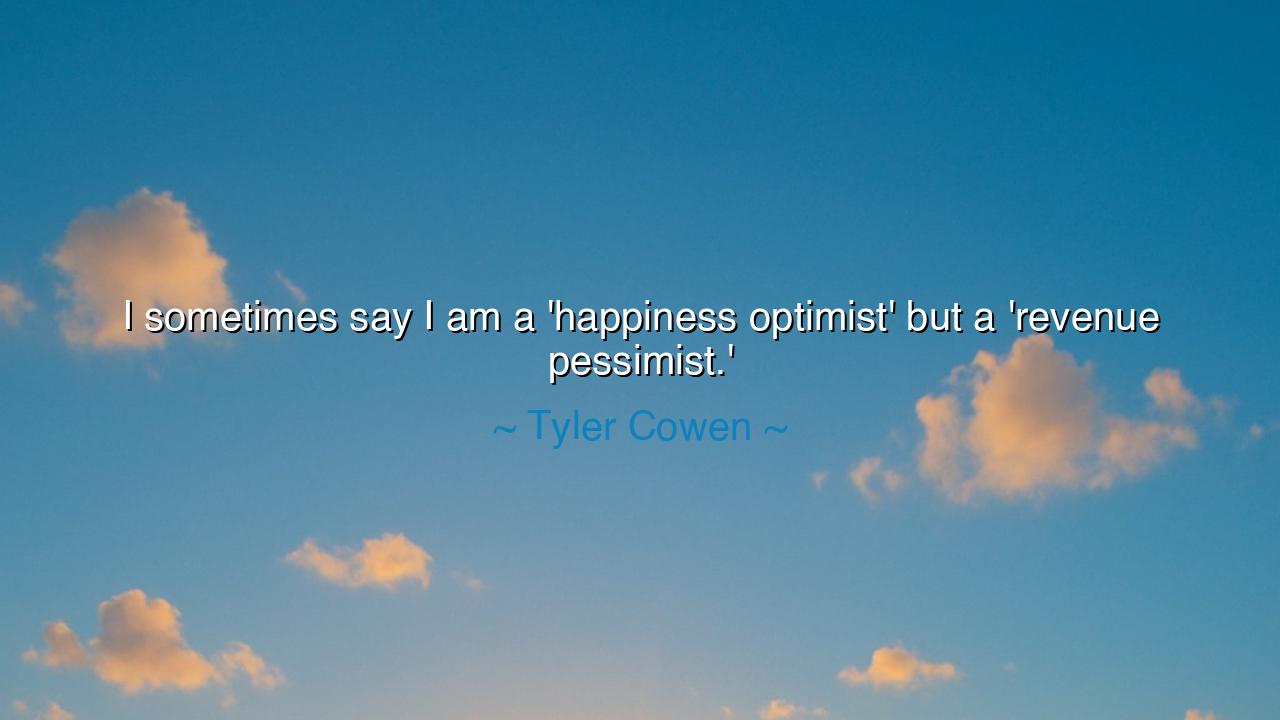
I sometimes say I am a 'happiness optimist' but a 'revenue






Hear, O seekers of understanding, the paradoxical wisdom of Tyler Cowen, the thinker of modern markets and the philosopher of human spirit, who declared: “I sometimes say I am a ‘happiness optimist’ but a ‘revenue pessimist.’” In these few words lies a vision for the age of uncertainty — a reminder that the wealth of a nation or a man may rise and fall, but the capacity for joy, meaning, and goodness lies beyond the reach of economic cycles. Cowen speaks not from despair, but from discernment; not from cynicism, but from hope tempered by realism. His is the voice of one who has seen that prosperity alone does not sustain the soul, and that even when revenue declines, the human heart may yet flourish.
The origin of these words comes from Cowen’s reflections as an economist who studies both growth and happiness — two forces that often diverge in the course of history. He observed that while nations may experience stagnation, and innovation may falter in certain ages, the wellspring of human happiness continues to flow. For though wealth may diminish, the optimism of spirit, the ingenuity of mind, and the resilience of love remain untouched. Thus, he divides his vision into two realms: the material and the moral. In the first, he admits pessimism — for the economy may falter, and resources may dwindle. But in the second, he proclaims hope — for the inner light of humanity cannot be extinguished by the shadow of economic decline.
In the ancient days, wise men spoke much the same. The philosopher Epictetus, born a slave, taught that the only true possession of man is his mind and his virtue. Gold may vanish, empires may crumble, but the one who guards his inner freedom remains rich. Similarly, Cowen’s happiness optimism calls upon the spirit to find meaning not in the measure of coins, but in the measure of character. He reminds us that joy is a skill, not a circumstance — a discipline of gratitude, of connection, of curiosity. The world may lose its wealth, but not its wonder.
Yet the revenue pessimist is no fool. He acknowledges the fragility of prosperity — the ease with which civilizations fall into complacency, the slow decay that follows abundance. History is a cycle of flourishing and decline. The Roman Empire, swollen with conquest, forgot the virtues that had built it and sank beneath its own luxury. The Venetian Republic, once the heart of trade, became stagnant when it ceased to dream. Cowen warns us: economic pessimism is not despair, but vigilance. It is the sober wisdom that reminds us that wealth, untended by innovation and discipline, will fade like a field left fallow.
Thus, Cowen’s quote becomes a call to balance — to live with hope in the heart and realism in the mind. A happiness optimist rejoices in what cannot be taken away; a revenue pessimist prepares for what might fail. This dual vision is the mark of the wise. For optimism alone can lead to carelessness, while pessimism alone can lead to paralysis. To live well is to marry both — to hope without illusion, and to prepare without fear.
Consider the story of Japan after the devastation of World War II. The nation’s revenue was destroyed, its cities reduced to ash. Yet the people, guided by discipline and purpose, rebuilt their homeland with hands and hearts of steel. They did not wait for wealth to bring them happiness; instead, their happiness optimism fueled their recovery, and their revenue pessimism made them prudent, diligent, and enduring. From that ashes rose not only prosperity, but resilience — the kind of prosperity that is not measured merely in money, but in spirit.
So take this lesson to heart, O listener: when you walk through a world uncertain in wealth, do not let your joy falter. Be a happiness optimist — find wonder in small things, beauty in effort, and meaning in the simplest acts of kindness. Yet be a revenue pessimist — plan with care, build with foresight, save with wisdom. Do not assume that prosperity will last forever; guard it, tend it, earn it anew each day. In doing so, you will live as the ancients counseled — neither reckless in hope nor paralyzed by fear, but steadfast in purpose and serene in soul.
For the truest wealth is not stored in banks but in hearts; not counted in numbers, but in virtues. Let your optimism feed your courage, and your pessimism temper your pride. Thus shall you live wisely — rejoicing when fortune smiles, enduring when it withdraws, and always remembering that happiness, unlike revenue, depends not on the state of the world, but on the strength of your spirit.






AAdministratorAdministrator
Welcome, honored guests. Please leave a comment, we will respond soon